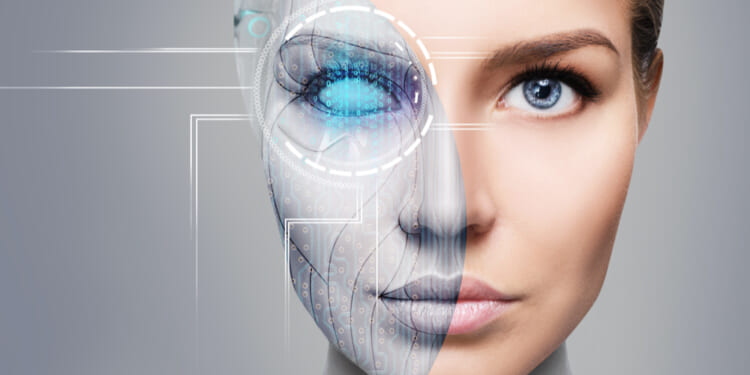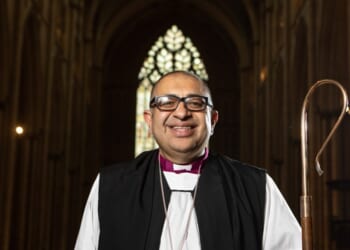(LifeSiteNews) — Disneyland recently revealed that it was going to unveil an animatronic version of Walt Disney. This robotic version of Disney was going to show the world what he was like by mimicking his words and actions when he was alive. But his granddaughter Joanna Miller rejected the idea, saying, “You could never get the casualness of his talking, interacting with the camera, [or] his excitement to show and tell people about what is new at the park. You cannot add life to one empty of a soul or essence of the man.”
This is the coming age of transhumanism, of trying to give eternal life to mere mortals. Transhumanism, though the culmination of a materialist quest, increasingly sounds more like a religion where artificial intelligence (AI) represents the way by which humans will reach ultimate perfection. Pope Francis warned against such a false hope in this cornerstone of transhumanism:
By turning to AI as a perceived ‘Other’ greater than itself, with which to share existence and responsibilities, humanity risks creating a substitute for God. However, it is not AI that is ultimately deified and worshipped, but humanity itself—which, in this way, becomes enslaved to its own work. (Antiqua et Nova 105)
At this point it’s time to look at some of the major tenets of transhumanism and compare them to Christianity, so as not to get confused by the mirage of humanity being saved by technology. I found five major points where the two diverge.
First, transhumanism seeks to extend life indefinitely. Although the means to do this have not been expressly accomplished, this is the goal and the hope. However, this hope is based on the merging of technology and humanity. According to Ray Kurzweil’s vision of transhumanism, “We would transfer or ‘resurrect’ our minds onto supercomputers, allowing us to live forever. Our bodies would become incorruptible, immune to disease and decay…”
For Christianity, the way we attain eternal life is based on cooperating with God’s grace – not technology. In short, transhumanism attempts to extend one’s human earthly existence, whereas Christianity aims to extend one’s spiritual existence.
Let’s imagine scientists do find the means to extend life indefinitely. Do you think that extension will be available to ordinary citizens, or perhaps to the highest bidder? For Christianity, on the other hand, eternal life is open to all mankind regardless of economic status. Both Christianity and transhumanism appeal to the virtue of hope; the question is in whom are you going to put your hope, Jesus Christ or the transhumanists?
Second, transhumanism seeks bodily and cognitive enhancement by means of technology. Biological enhancement has already happened by means of hearing aids, pacemakers, hip replacements, and ear devices, which are all physical repairments in our bodies. Transhumanism hopes to bring this to a new level by enhancing our very thoughts by means of AI. The comments of Elon Musk demonstrate this when he says that “the long‑term aspiration with Neuralink would be to achieve a symbiosis with artificial intelligence.”
Christianity, on the other hand, states that humans are blessed with free will and a conscience, “the ‘inner voice’ where a person discerns right and wrong in light of reason and God’s law” (CCC 1776). Free will can only operate without undue coercion by an external force. Having AI connected to the mind and feeding it ideas would be the ultimate external force. As Ryan Bilodeau writes in Crisis Magazine, “The Church has long defended the rights of individuals to make moral decisions free from external coercion, and Neuralink’s potential to influence human thought could represent a profound threat to this freedom.”
Third, transhumanism seeks to redesign human nature and change the nature of the human being. Scientific advancements could eventually reach the point where genes can be edited, either to eliminate disease or to enhance traits such as hair and eye color, muscle strength, or intelligence. We could soon enter a new age of eugenics where genes are decided before an embryo begins the natural growing process. These genetic changes could potentially reshape the human species over generations.
Christianity is opposed to altering human nature at the genetic level and considers that toying with God’s creation. Instead, creation is considered a gift that is to be appreciated and respected as God’s handiwork. Embryos are not a product to be manipulated according to likes and dislikes, but fundamentally a human being who has a right to be accepted as is.
In transhumanism, embryos can be envisioned to be good or bad according to their traits such as hair or eye color. What difference is there between that and the past, where some humans were considered non-human because of their race or ethnicity? It’s a new form of the same old racism and eugenics.
Fourth, transhumanism and Christianity differ greatly in their understanding of consciousness. Transhumanism identifies consciousness as a mere movement of neurons, or the passage of information from one neuron to another – that is, only chemical and physical interactions. Since consciousness is a matter of data transfer, at some point a scientist could be able to transfer consciousness from an individual to a robot, a phenomenon called “mind uploading.”
But Christianity sees consciousness as a proper characteristic of the soul which God created as a unique individual, and thus unable to be transferred to another entity. The soul is what gives life, unity, and identity to the body, without which there is only a corpse. Aristotle calls the soul the “form of the body,” and it contains the powers of intellect and free will, which transcend the materiality of the body. Consciousness, reason, and moral decision-making originate in the soul and are communicated by means of the body.
Finally, transhumanism pretends to eliminate suffering altogether by means of technology. David Pearce, a prominent transhumanist, puts it this way:
How can we fix the problem of suffering? How can we design a new architecture of mind with a civilized signaling system: life animated entirely by gradients of bliss? How can we extend a bio happiness revolution to the rest of the living world? How can we create a transhumanist ‘triple S’ civilization of superintelligence, super longevity and super happiness for all sentient beings?
Christianity is not opposed to healing measures, but it offers to give meaning to suffering as a means to save souls and unite closely with the Suffering Servant. “Each man, in his sufferings, can also become a sharer in the redemptive suffering of Christ.” (Salvifici Doloris §19)
Look at all the scientific advancements of the 20th century – they have not solved the problem of human conflict. Wars are raging over territory as I write this article. Technology does not improve human relations per se – only living a life of virtue and charity can do that. The Church states in Antiqua et Nova, “AI, like any technology, can be part of a conscious and responsible answer to humanity’s vocation to the good. However, AI must be directed by human intelligence to align with this vocation, ensuring it respects the dignity of the human person.” (48)
In conclusion, transhumanism and Christianity both recognize that we are not satisfied with our limits and long for something greater. But they differ profoundly in how that longing is fulfilled. Transhumanism places its hope in science and technology, promising freedom from suffering, longer life, and human enhancement — a kind of new gospel of progress. Christianity, instead, points to God’s grace: eternal life, the redemption of suffering, and the perfection of our humanity in Christ.
In the end, the question is simple yet decisive: will our hope rest in machines of our own making, or in the God who made us for life without end? Put another way, the choice is not between progress and faith, but between a false eternity crafted by man and the true eternity offered by God.
George Matwijec Ph.L is an adjunct philosophy teacher at Immaculata University who specializes in teaching knowledge and logic. He is the author of a book entitled My Interview with AI. He can be reached at iteacher101.com or his Substack page located here.
















